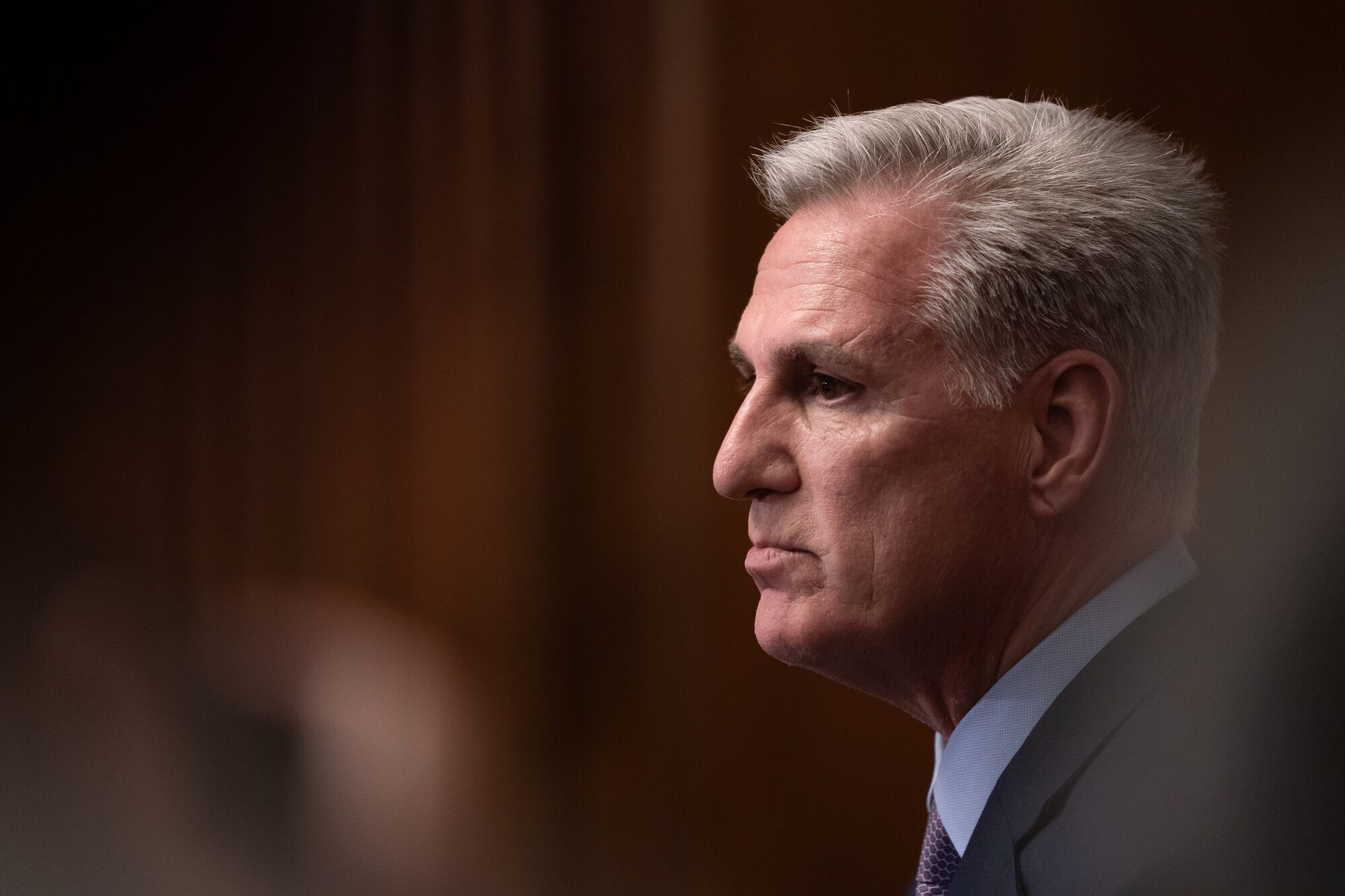Congressman-outcast: Why was McCarthy ousted as House speaker and what does it mean for Ukraine?
 Photo: U.S President Joe Biden and ex-speaker Kevin McCarthy (Getty Images)
Photo: U.S President Joe Biden and ex-speaker Kevin McCarthy (Getty Images)
How and why the speaker of the U.S. House of Representatives, Kevin McCarthy, was forced to resign, why choosing a new speaker will be challenging, and how this threatens American aid to Ukraine - more details in the material by RBC-Ukraine.
To prepare this article, materials from The New York Times, The Washington Post, MSNBC, and other American media sources were used, as well as the live broadcast of the United States House of Representatives session.
The most popular word at yesterday's session of the United States House of Representatives was "chaos." Supporters and opponents of speaker Kevin McCarthy accused each other of destabilizing the work of the House and American democracy as a whole. As a result, the situation indeed turned into complete chaos – McCarthy was ousted from office at the initiative of his fellow party members. For the first time in 234 years, throughout the entire existence of the House of Representatives, its speaker was forced to resign.
Hostage to the Trumpists
McCarthy's position as a Republican, elected to office in January of this year, has always been very precarious. Essentially, he was immediately taken hostage by a small but hyperactive group of party colleagues, its far-right wing, which aligned itself with former President Donald Trump. Due to their opposition, McCarthy was only able to become speaker on the 15th attempt. The Trumpist wing of the Republicans consists of several dozen people, with a dozen or so being the most radical.
The issue is that after last year's elections, the Republican Party formed a very fragile majority: 222 seats against 213 for the Democrats. And just a few dissatisfied members within the Republican faction were enough to thwart any decision (unless they sought help from Democratic congressmen).
Throughout his speakership, McCarthy tried to navigate the political waters: sometimes he would align with the Democrats, and other times he would side with the Trumpists (such as when deciding to initiate impeachment proceedings against President Joe Biden). The final straw was McCarthy's decision to jointly pass a temporary budget with the Democrats to prevent a U.S. government shutdown expected on October 1st.
The Trumpists opposed this move, demanding cuts and reallocations of funds, particularly for border security with Mexico, and withholding money from Ukraine. Essentially, they hoped that the paralysis of government amid the ongoing presidential campaign would harm Biden's electoral positions.
As a result, one of the most fervent far-right opponents of providing aid to Ukraine, Matt Gaetz, introduced a resolution in the House to remove McCarthy from office. One of Gaetz's arguments in favor of McCarthy's resignation was that the speaker allegedly made a secret deal with Biden to support Ukraine.
In January, McCarthy agreed to changes in the rules, allowing such a resolution to be introduced by a single congressman. This was one of his concessions to the Trumpists to secure the speaker position – and it ultimately worked against him.

Speaker of the House of Representatives Kevin McCarthy before his resignation (Photo: Getty Images)
However, the overwhelming majority of the Republican faction was against McCarthy's ousting. To stay in office, he only needed to secure the support of at least a small portion of the Democrats. They didn't even have to vote directly against his resignation – abstaining or not showing up for the vote was sufficient. Unlike the House of Commons, for example, the House of Representatives does not have a fixed number of votes (such as 226 "for" in the House of Commons) to pass a resolution – it just needs more votes "for" than "against."
But the Democrats decided not to save the speaker. They accused McCarthy of being unable to control his faction, multiple breaches of agreements, excessive loyalty to Trump, attempts to sabotage the work of the committee investigating the Capitol riot in 2021, and more. The final straw was a video that one of the Democrats showed to his colleagues – McCarthy on television blamed the Democrats for trying to cause a government shutdown. "[McCarthy] dug his own grave," The Washington Post quoted a Democratic congressman.
As a result, 216 congressmen voted in favor of McCarthy's removal (including 8 Republicans), while 210 voted against. The Democratic faction voted unanimously in favor.
The key question that House members kept asking themselves was, "What's next?" For now, the House is temporarily led by Republican Patrick McHenry, and the congressmen have gone on a one-week recess. McCarthy has already stated that he will not run for the speaker position again, and there is currently no obvious favorite to succeed him.
There are also no clear rules defining the powers of temporary Speaker McHenry. According to most experts, he won't be able to fully control the House, including the passing laws; he will only conduct a vote for the new speaker.
Essentially, the House of Representatives finds itself in a deadlock situation. The Democrats are in the minority and cannot elect their speaker. The Trumpist Republicans can, as they did in January, obstruct the appointment of any of their fellow party members they don't like. Moreover, the majority of Republicans would oppose a Trumpist candidate.
In theory, the solution could be to create a broad coalition of "reasonable" Republicans and Democrats to elect a speaker. However, this goes against established rules in American politics and the current political climate.
The Democrats have decided to symbolically step back from the situation, publicly suggesting that Republicans should sort out their problems on their own. For Republicans to seek help from the parliamentary minority would be an admission of their inability to control the House.
Strength factor
All of these American disruptions have a direct impact on Ukraine. The absence of funding for Ukraine in the temporary U.S. budget, calculated until mid-November, has already seriously concerned Kyiv.
Not only Kyiv – the White House, along with the Pentagon, has been making statements of unwavering support for Ukraine over the past few days and promising further assistance. Nonpublic work is also being done – representatives of the administration are actively meeting with NATO and the G7 partners, persuading them that nothing has changed, and the U.S. will continue to help Ukraine.

President Volodymyr Zelenskyy and President Joe Biden at the meeting in the White House (Photo: Getty Images)
"Regardless of what happens in the House of Representatives, that all the House leadership is supportive of continuing to help Ukraine and the vast majority of House members on the Republican side are in support of continuing to help Ukraine. We cannot under any circumstances allow America’s support for Ukraine to be interrupted," said the NSC Coordinator for Strategic Communications, John Kirby. Ukrainian leadership has also stated that U.S. support will continue.
The concern of the U.S. and Ukraine is easily understood. Throughout the full-scale war, Washington's position on providing Ukraine with weapons and other assistance has been a beacon for the rest of the Western coalition. "Everyone looks at the Americans; if they give us something new, everyone else can give. As long as the U.S. doesn't give, everyone else holds back," RBC-Ukraine has heard such observations from sources in the Ukrainian government many times.
As of today, there hasn't been a catastrophe. The Pentagon still has $5.4 billion left in its budget that can be allocated to Ukraine for military assistance from its own reserves. However, this won't last long – for successful warfare next year, new multi-billion-dollar aid packages will be needed.
Their allocation depends on the House of Representatives, which in the near future will be fully immersed in the election of a new speaker and internal intrigues. Even Ukraine's sympathizers must constantly remember the presidential elections next year and their own political prospects. Ukraine is increasingly becoming a hostage to the U.S. electoral campaign, and this dependency will only grow over time.

